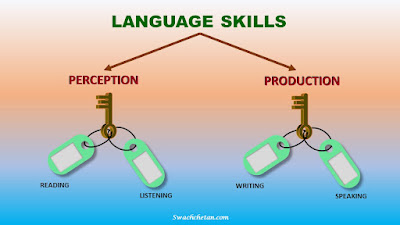The
essence of communication lies in language skills. Right from the moment we are born, we learn
one language or the other but how do we pick language skills? What constitutes language Skills?
The
answer lies in using the language in four different ways: Reading, Listening, Writing,
and Speaking. Did you know that human
beings have separate centers in the brain, one for perceiving language and the other for producing language?
Damages to these centers result in the impairment of language functions.
The perception part comes in Reading and
Listening whereas the production part comes in Writing and
Speaking.
Just
because we use a language, does not mean that the skills necessary for it are automatically
fine-tuned. Skills are learned only
through trial-and-error learning and it requires continuous and consistent
practice. The ideal situation where
these skills are thoroughly learned is when we can understand whatever we read
or listen to and we can write or speak without errors.
However,
mistakes do happen but our primary job is to keep correcting these mistakes so
that they are not repeated.
We
need to understand that listening is more than hearing and
that reading
is more than seeing. There will be
complex processing of information happening when we listen and read so that
specific imagery is created in our brains.
Similarly,
speaking
is more than producing sounds or talking and writing is more than
doodling or scratching with a pen or pencil.
What
they constitute is meaning, which gets communicated to us when we listen or
read and to the other person when we speak or write.
For
it to contain meaning, certain accepted rules are followed by the people who
use the language. This set of rules is
known as Grammar. We are taught
grammar in schools but we rarely know about its importance in our future life. Composition enables the sentences to be
structured so that communication becomes easy.
Each
language is rich in its repertoire and each meaning has more than one word, as well
as sometimes each word has more than one meaning. This is where we need to enrich ourselves
with vocabulary. The more words we know in a language, the
better will be our speech.
Each
word has letters arranged in a particularly accepted way, which is referred to
as spelling. We have to practice spelling judiciously
as a wrongly spelled word can convey a different meaning.
When we speak the same
words, pronunciation becomes very crucial and we need to learn this
systematically. Though pronunciation may
change from region to region, we need to acclimatize ourselves to the most
accepted ones.
Another aspect that goes along with the speaking of the language is the use of an accent that changes from one region to another. However, we have to develop a neutral accent so that the listener has no confusion in understanding what we say.
In
essence, language skills enable us to be proficient in communication so that it
becomes easier to live, be, and work together.
HOW TO CONNECT WITH THE AUDIENCE?
HOW TO BE EFFECTIVE IN PUBLIC SPEAKING?
The Psychology of Writing - 50 Tips to Writing Efficiently
SEMINAR – HOW TO PREPARE FOR IT & PRESENT IT?












I read the above article and got some knowledge from your article which is about language courses It's actually great and useful data for us. Thanks for sharing it.
ReplyDeletePlease do not include any spam links in the comment box.